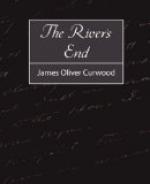“And from all that you came back the same day I came,” she said in a low, awed voice. “You came back from that!”
He remembered the part he must play.
“Yes, three years of it. If I could only remember as well, only half as well, things that happened before this—” He raised a hand to his forehead, to the scar.
“You will,” she whispered swiftly. “Derry, darling, you will!”
Wallie sidled in and, with an adoring grin at Mary Josephine, suggested that he had more coffee and toast ready to serve, piping hot. Keith was relieved. The day had begun auspiciously, and over the bacon and eggs, done to a ravishing brown by the little Jap, he told Mary Josephine of some of his bills of fare in the north and how yesterday he had filled up on bacon smell at Andy Duggan’s. Steak from the cheek of a walrus, he told her, was equal to porterhouse; seal meat wasn’t bad, but one grew tired of it quickly unless he was an Eskimo; polar bear meat was filling but tough and strong. He liked whale meat, especially the tail-steaks of narwhal, and cold boiled blubber was good in the winter, only it was impossible to cook it because of lack of fuel, unless one was aboard ship or had an alcohol stove in his outfit. The tidbit of the Eskimo was birds’ eggs, gathered by the ton in summer-time, rotten before cold weather came, and frozen solid as chunks of ice in winter. Through one starvation period of three weeks he had lived on them himself, crunching them raw in his mouth as one worries away with a piece of rock candy. The little lines gathered in Mary Josephine’s forehead at this, but they smoothed away into laughter when he humorously described the joy of living on nothing at all but air. And he added to this by telling her how the gluttonous Eskimo at feast-time would lie out flat on their backs so that their womenfolk could feed them by dropping chunks of flesh into their open maws until their stomachs swelled up like the crops of birds overstuffed with grain.
It was a successful breakfast. When it was over, Keith felt that he had achieved a great deal. Before they rose from the table, he startled Mary Josephine by ordering Wallie to bring him a cold chisel and a hammer from Brady’s tool-chest.
“I’ve lost the key that opens my chest, and I’ve got to break in,” he explained to her.
Mary Josephine’s little laugh was delicious. “After what you told me about frozen eggs, I thought perhaps you were going to eat some,” she said.




